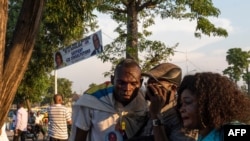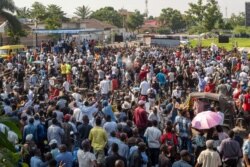A political crisis in the perennially restive Democratic Republic of Congo deepened Monday, as lawmakers trashed Parliament after President Felix Tshisekedi moved to scrap the shaky ruling coalition.
Tshisekedi's government has been in tatters, with members of Parliament loyal to his powerful predecessor Joseph Kabila, who command more than 300 seats in the 500-member Parliament, increasingly at odds with supporters of the president.
On Sunday, Tshisekedi said he planned to form a new coalition and warned he might be forced to dissolve Parliament and hold fresh elections in a country wracked for decades by conflict and corruption.
"The present majority has crumbled, and a new majority is required," he said, adding that if he failed to form a new coalition, fresh elections would be the solution "using the constitutional prerogatives that have been invested in me to come back to you, a sovereign people, and ask for a majority."
The announcement sparked violence in Parliament Monday, with sources close to the assembly's pro-Kabila speaker charging that lawmakers of Tshisekedi's party went on the rampage, destroying desks and chairs.
Video footage showing individuals overturning desks went viral on social media. An Agence France-Presse journalist said all the furniture on the podium was wrecked.
"The plenary session has been deferred to another date," Parliament said, denouncing the destruction of furniture and "the presence of armed bodyguards inside the assembly."
Tshisekedi, meanwhile, held emergency talks with pro-Kabila Prime Minister Sylvestre Ilunga Monday afternoon, Ilunga's office said.
The growing tensions have sparked international alarm. The African Union called on the country's leaders to "work resolutely and sincerely for national harmony and to preserve peace and stability."
The United Nations envoy to DR Congo warned Monday of the security threat posed by the political deadlock, saying the country "cannot afford a serious institutional crisis."
"(If) this delicate political situation persists, it could have serious repercussions on the economic and security situation of the country," Leila Zerrougui told the Security Council via video link.
The session was called to discuss the U.N.'S MONUSCO mission of about 15,000 peacekeepers whose mandate is to expire on December 20.
"The political situation that DR Congo is experiencing is very uncertain," Zerrougui said, calling on the Security Council to "play an important role in encouraging a negotiated resolution of this political crisis."
She called for "stable and functional institutions" to be allowed to return to work as soon as possible.
Tshisekedi took over from Kabila in January 2019 in the mineral-rich DRC's first peaceful transition since independence from Belgium in 1960.
But the president's room for implementing much-trumpeted reforms was hampered by the need to forge a coalition with the pro-Kabila Common Front for the Congo (FCC), overwhelmingly dominant in the legislature.
Kabila ruled the DRC for 18 years until he stepped down after long-delayed elections in December 2018.
He retains considerable clout through political allies and officers he appointed to the armed forces and is also a senator for life.





